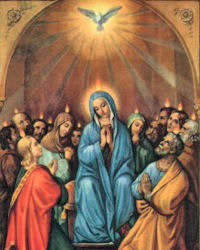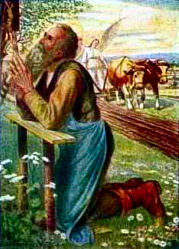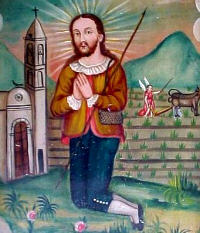Easter: May 15th
Saturday of the Sixth Week of Easter; Optional Memorial of St. Isidore (USA)
» Enjoy our Liturgical Seasons series of e-books!
Isidore was a Spanish laborer who worked most of his life as a ploughman for a nobleman who lived near Madrid, Spain. Although working many hours a day, he never failed to attend daily Mass, and spend time praying before the Holy Eucharist. He married a maid-servant, Maria de la Cabeza, who was also canonized a saint. They were always willing to help their neighbors and worked with the poor in the city slums. In 1947, he was proclaimed the Patron of the National Rural Life Conference in the United States.
According to the 1962 Missal of St. John XXIII of the Roman Rite, today is the feast of St. John Baptist de la Salle. He was inspired by God to give a Christian education to the poor, he founded the Brothers of the Christan Schools which soon spread throughout the world. In private life he treated himself with extreme rigor. He died in 1719. His feast in the Ordinary Form of the Roman Rite is celebrated on April 7.
According to the Roman Martyrology, today is the feast of St. Dymphna, the daughter of a pagan Celtic chieftain and a Christian. She fled from her home on the death of her mother to escape the incestuous interest of her father and went to Antwerp accompanied by her confessor, St. Gerebernus, and two companions. They then built an oratory at Gheel where they lived as hermits. Tracked down by Dymphna's father, the two companions and the priest were murdered by his men, and Dymphna was beheaded by her father when she refused to return with him.
The feast of the Queen of Apostles was established on the first Saturday after the Ascension by the Sacred Congregation of Rites at the request of the Pallottine Fathers. Mary initiated her mission as Queen of Apostles in the Cenacle. She gathered the apostles together, comforted them, and assisted them in prayer. Together with them she hoped, desired and prayed; with them her petitions were heeded and she received the Holy Spirit on the day of Pentecost.
Mary, Queen of Apostles
Mary is Queen of Apostles because she was chosen to be the Mother of Jesus Christ and to give him to the world; she was made the apostles' Mother and our own by our Savior on the cross. She was with the apostles while awaiting the descent of the Holy Spirit, obtaining for them the abundance of supernatural graces they received on Pentecost. The most holy Virgin was and always will be the wellspring for every apostolate.
She exercised a universal apostolate, one so vast that it embraced all others. The apostolate of prayer, the apostolate of good example, the apostolate of suffering—Mary fulfilled them all. Other people have practiced certain teachings of the Gospel; Mary lived them all. Mary is full of grace, and we draw from her abundance.
Mary attracts the zealous to the various apostolates, then protects and defends all these works. She sheds on each the warmth of her love and the light of her countenance. She presented Jesus in a manner unparalleled throughout the ages. Her apostolate is of the highest degree--never to be equaled, much less surpassed.
Mary gave Jesus to the world and with Jesus came every other blessing. Thus, because of Mary we have the Church: "Mary is the Mother of the Church not only because she is the Mother of Christ and his most intimate associate in 'the new economy when the Son of God took a human nature from her, that he might in the mysteries of his flesh free man from sin,' but also because 'she shines forth to the whole community of the elect as a model of the virtues' (Lumen Gentium. 55, 65).  She now continues to fulfill from heaven her maternal function as the cooperator in the birth and development of the divine life in the individual souls of the redeemed" (The Great Sign, by Paul VI). What do we have of value that we have not received through Mary? It is God's will that every blessing should come to us through her.
She now continues to fulfill from heaven her maternal function as the cooperator in the birth and development of the divine life in the individual souls of the redeemed" (The Great Sign, by Paul VI). What do we have of value that we have not received through Mary? It is God's will that every blessing should come to us through her.
Because the Blessed Mother occupies a most important position in God's plan of salvation, all humanity should pay homage to her. Whoever spreads devotion to the Queen of Apostles is an apostolic benefactor of the human race, because devotion to Mary is a treasure. Blessed is the person who possesses this treasure! Mary's devotees will never be without grace; in any danger, in every circumstance they will always have the means to obtain every grace from God.
Several religious congregations practice devotion to Mary under the title of Queen of Apostles, including the Pallotines, the Marianists, and the congregations founded by Bl. James Alberione (the Society of St. Paul, the Daughters of St. Paul, and several others). In the twentieth century, Bl. Alberione promoted this devotion in a particular way.
—Excerpted from Favorite Prayers and Novenas, copyright 1997 Pauline Books & Media
Things to Do:
- Say Novena to Queen of Apostles
- Read Pentecost with Mary, Queen of Apostles on Catholic Culture
St. Isidore the Farmer
 When he was barely old enough to wield a hoe, Isidore entered the service of John de Vergas, a wealthy landowner from Madrid, and worked faithfully on his estate outside the city for the rest of his life. He married a young woman as simple and upright as himself who also became a saint-Maria de la Cabeza. They had one son, who died as a child.
When he was barely old enough to wield a hoe, Isidore entered the service of John de Vergas, a wealthy landowner from Madrid, and worked faithfully on his estate outside the city for the rest of his life. He married a young woman as simple and upright as himself who also became a saint-Maria de la Cabeza. They had one son, who died as a child.
Isidore had deep religious instincts. He rose early in the morning to go to church and spent many a holiday devoutly visiting the churches of Madrid and surrounding areas. All day long, as he walked behind the plow, he communed with God. His devotion, one might say, became a problem, for his fellow workers sometimes complained that he often showed up late because of lingering in church too long.
He was known for his love of the poor, and there are accounts of Isidore's supplying them miraculously with food. He had a great concern for the proper treatment of animals.
He died May 15, 1130, and was declared a saint in 1622 with Ignatius of Loyola, Francis Xavier, Teresa of Avila and Philip Neri. Together, the group is known in Spain as "the five saints."
Patronage: against the death of children; agricultural workers; day laborers; farm workers; farmers; field hands; for rain; husbandmen; laborers; livestock; Mexican peasants; ranchers; Spanish peasants; rural communities; Farmers; farm workers; ranchers; rural communities; National Catholic Rural Life Conference in the United States.
See CatholicSaints.info for a full listing of organizations and locations that claim St. Isidore as patron.
Symbols and Representation: White oxen; spade; hoe or rake; plough
Highlights and Things to Do:
- St. Isidore (and his wife Maria) are the patrons of the Catholic Rural Life Conference. Read this reflection on St. Isidore, their patron, some ideas to celebrate his feast and Novena to St. Isidore.
- Learn more about St. Isidore the Farmer:
- See Christian Iconography for some images of St. Isidore.
- The remains of St. Isidore Hand his wife Santa María de la Cabeza are located in Church of San Isidro in Madrid.
- Establishing or replenishing a a Mary garden would be an appropriate way to celebrate the combination of the feast of St. Isidore and the month of May, dedicated to Mary.
- Visit mgardens.org to learn more about Mary Gardens.
- There is also a lovely book on Mary gardens printed by St. Anthony Messenger Press called Mary's Flowers: Gardens, Legends and Meditations by Vincenzina Krymow.
- Visit Stokes Marys Gardens.
- Another book by Vincenzina Krymow is Healing Plants of the Bible which explains Biblical gardens and plants.
Two books we especially recommend: Cooking for Christ by Florence Berger (although we prefer the original 1949 edition; this is an edited version), and Rural Life Celebration Guide.






